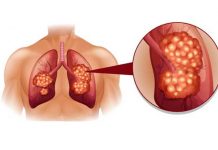
Lung cancer is a malignancy arising in the lungs. Carcinoma refers to uncontrolled growth of cells, giving rise to several abnormal cells. These abnormal cells are known as tumor cells. When these tumor cells invade the surrounding healthy tissues, these are referred to as malignant tumor. Origin of such a malignant tumor in the lung tissue is known as Lung Cancer.
Lung cancer is the second most common cancer in men and women, after prostate cancer and breast cancer. However, it is the leading cause of death due to cancer worldwide.
Smoking tobacco is the most common cause of lung cancer. Chronic smokers in their 70s are at the highest risk of developing lung cancer. However, the risk is directly related to the number of cigarettes you smoke per day and the number of years you have been smoking. Besides tobacco, exposure to various other carcinogens such as radon, asbestos, silica, chromium and even air pollution can lead to lung cancer.
Lung cancer can be either small cell or non-small cell carcinomas. Small cell carcinoma, though less common, is a more invasive variant. Non-small cell carcinomas are more common and less invasive.
Lung cancer usually produce symptoms in its advanced stages, when it has spread to distant organs (medically, known as metastasis).
Although it is a fatal condition, it has a good survival rate if diagnosed early. Based on the severity of the condition, lung cancer is treated by surgery, chemotherapy and radiotherapy.
Symptoms
The initial stage of lung cancer is marked by absence of symptoms. It mostly presents with symptoms when it has progressed considerably. Also, when lung cancer spreads to other organs, in particular bone, liver and brain, the symptoms may vary depending on the organ involved. The symptoms of lung cancer are as follows.[1]
- A newly developed cough that is persistent
- Coughing up blood
- Shortness of breath
- Hoarseness
- Chest pain
- Bone pain
- Unexplained weight loss
- Headache
Treatment
The treatment of lung cancer depends on the type of lung cancer (Small Cell or Non-small Cell Lung Cancer), stage of cancer (Stage 0 to Stage 4), the size of tumor, position of tumor and the general health of the patient. Chief treatment options for lung cancer, include surgery, chemotherapy (use of anti-cancer medications) and radiotherapy (use of radiation to kill cancer cells)
A small malignant tumor, confined to the lungs and not involving other organs, is surgically removed. Surgery can be combined with chemotherapy and radiotherapy based on the clinical scenario. If the tumor is large but confined to lungs, its surgical removal may pose difficulties. Hence, chemotherapy or radiotherapy may be given prior to surgery to shrink the tumor, which is then easily removed surgically. Also, surgery is usually followed by chemotherapy to kill the residual cancer cells which may have escaped the surgery.
A lung cancer which has involved other organs, is usually treated by radiotherapy alone or in a combination with chemotherapy.
If lung cancer has spread to distant organs, surgery and radiotherapy may be ineffective. Also, sometimes patient’s general health may not permit a safe surgical removal of tumor. In such cases, chemotherapy is the chief treatment method. Other treatment methods have also emerged, including biological therapy, cryotherapy, phototherapy and radiofrequency ablation.
Chemotherapy is the topic of interest of this article and includes cytotoxic drugs and targeted drug therapy. There are several classes of anti-cancer drugs, each with its primary indication in specific cancers. When it comes to lung cancer, an interesting fact is that small cell lung cancers although invasive, are more responsive to chemotherapy as compared to non-small cell lung cancers.
Various classes of drugs that are effective in lung cancer are described below.
1. Cytotoxic Drugs
These constitute the major drugs used in the treatment of lung cancer. Just like the normal non-cancerous cells of our body, cancer cells too have a genetic material, composed of DNA. This DNA is composed of several nitrogenous bases, such as adenine, guanine, thymine and cytosine. The cancerous cells multiply rapidly, replicating their genetic material, hence, invading the surrounding tissues. Cytotoxic drugs act against these multiplying cells, arrest their growth and subsequently kill these cells.
Various cytotoxic drugs which are used to treat lung cancer, are described below.
I. Platinum Coordination Complexes
This group of drugs specifically targets the DNA of cancer cells by binding to its seventh nitrogen atom of the guanine base. Thus, these drugs bind to DNA of cancer cells, causing DNA damage and eventually leading to cell-death.
Available as: Injectable preparations
A. Cisplatin
U.S. FDA Status: Approved for lung cancer
Availability: Prescription only
Generic name: cisplatin injection
Brand name: Cisplatin
Side-effects: Joint pain, trouble hearing, loss of balance, swelling of lower legs or feet, fatigue, weakness
Indicated in Pregnancy: Usually not indicated, but can be given if benefit outweighs fetal risk
Alcohol Content: Absent
B. Carboplatin
U.S. FDA Status: Approved for lung cancer
Availability: Prescription only
Generic name: carboplatin injection
Brand name: Carboplatin
Side-effects: Pain at the site of injection, fever, black tarry stools, blood in stools or urine, skin rash, itching
Indicated in Pregnancy: Usually not indicated, but can be given if benefit outweighs fetal risk
Alcohol Content: Absent
II. Antimetabolite
This group of drugs inhibits the metabolic process, which are essential for growth of cancerous cells, thus, producing a cytotoxic effect.
Available as: Injectable preparations
A. Pemetrexed
Tetrahydrofolic acid (THFA) is an important compound required for survival of cancerous cells. THFA is produced in the cells by action of several enzymes. Pemetrexed blocks the action of one such enzyme, known as thymidylate synthase. By inhibiting the synthesis of THFA, pemetrexed halts the growth of cancerous cells, eventually killing the cancer cells.
U.S. FDA Status: Approved for lung cancer
Availability: Prescription only
Generic name: pemetrexed disodium
Brand name: Alimta injection
Side-effects: Bleeding gums, black tarry stools, chills, fever, cough, lack of coordination, sore throat
Indicated in Pregnancy: Usually not indicated, but can be given if benefit outweighs fetal risk
Alcohol Content: Absent
B. Gemcitabine
This antimetabolite cytotoxic drug blocks the action of several enzymes, responsible for DNA synthesis and repair. It does so by binding to the DNA of cancer cells, leading to failure of enzymatic action on the DNA. Another unique property of gemcitabine is its ability to “self-potentiate” its action, i.e., as gemcitabine exerts its action, its inhibitory action further enhances.
U.S. FDA Status: Approved for lung cancer
Availability: Prescription only
Generic name: gemcitabine hydrochloride
Brand name: Gemzar injection
Side-effects: Bleeding gums, chest pain, blood in urine or stools, cloudy urine, diarrhea, cough or hoarseness
Indicated in Pregnancy: Usually not indicated, but can be given if benefit outweighs fetal risk
Alcohol Content: Absent
III. Vinca Alkaloids
Every cancer cell requires a structure, called microtubules to divide and replicate. The formation of microtubules requires a protein, called tubulin. Vinca alkaloids bind to tubulin protein, thus blocking synthesis of microrubules and hence, arresting cell division. Non-dividing cancer cells eventually die.
Available as: Injectable preparations
A. Vincristine
U.S. FDA Status: Approved for lung cancer
Availability: Prescription only
Generic name: vincristine sulfate
Brand name: Oncovin injection
Side-effects: Cough or hoarseness, black tarry stools, fever or chills, red spots on skin
Indicated in Pregnancy: Usually not indicated, but can be given if benefit outweighs fetal risk
Alcohol Content: Absent
B. Vinorelbine
It is primarily indicated in non-small cell lung cancer.
U.S. FDA Status: Approved for lung cancer
Availability: Prescription only
Generic name: vinorelbine tartarate
Brand name: Navelbine injection
Side-effects: Chills, fever, cough or hoarseness, sore throat, back pain, painful urination
Indicated in Pregnancy: Usually not indicated, but can be given if benefit outweighs fetal risk
Alcohol Content: Absent
IV. Taxanes
For any cancer cell to divide, the microtubules have to depolymerize and organize themselves in a specific pattern. Similar to vinca alkaloids, taxanes bind to beta-tubulin protein. But unlike vinca alkaloids, taxanes enhance the polymerization of tubulin protein, producing abnormal bundles of microtubules, which are unfavorable for division and replication of cancer cells.
Available as: Injectable preparations
A. Paclitaxel
U.S. FDA Status: Approved for lung cancer
Availability: Prescription only
Generic name: paclitaxel
Brand name: Taxol injection
Side-effects: Blurred vision, black tarry stools, confusion, numbness, fever, chills, dizziness, back pain
Indicated in Pregnancy: Usually not indicated, but can be given if benefit outweighs fetal risk
Alcohol Content: Contains 49.7% (v/v) dehydrated alcohol
B. Docetaxel
U.S. FDA Status: Approved for lung cancer
Availability: Prescription only
Generic name: docetaxel
Brand name: Taxotere injection
Side-effects: Weight gain, swelling of face, stomach, fingers, fatigue or weakness, numbness in hands, leg and feet
Indicated in Pregnancy: Usually not indicated, but can be given if benefit outweighs fetal risk
Alcohol Content: Contains 0.395 grams of dehydrated alcohol
V. Topoisomerase II Inhibitor
In order to replicate or produce a copy of itself, DNA helix of cancer cells need to break. This break (medically known as unwinding) is facilitated by an enzyme, called Topoisomerase-2, which unwinds both the strands of DNA. By blocking this enzyme, Topoisomerase I inhibitor arrests the cell division process of cancer cells, thus killing these cells.
Available as: Injectable preparations
A. Etoposide
U.S. FDA Status: Approved for lung cancer
Availability: Prescription only
Generic name: etoposide phosphate
Brand name: Etopophos preservative free injection
Side-effects: Bleeding gums, black tarry stools, chest pain, blood in urine, chills, cough, fever
Indicated in Pregnancy: Usually not indicated, but can be given if benefit outweighs fetal risk
Alcohol Content: Absent
VI. Topoisomerase I Inhibitor
As already stated, DNA breaks are crucial to the replication process of a cell. Topoisomerase I enzyme also breaks the DNA strands, but unlike Topoisomerase II, it only unwinds a single strand of DNA. Hence, by blocking this enzyme, topoisomerase I inhibitor halts the cell replication and kills the cancer cells.
Available as: Injectable preparations
A. Topotecan
U.S. FDA Status: Approved for lung cancer
Availability: Prescription only
Generic name: topotecan hydrochloride
Brand name: Hymactin injection
Side-effects: Bleeding gums, black tarry stools, chest pain, blood in urine, chills, cough, fever
Indicated in Pregnancy: Usually not indicated, but can be given if benefit outweighs fetal risk
Alcohol Content: Absent
B. Irinotecan
U.S. FDA Status: Approved for lung cancer
Availability: Prescription only
Generic name: irinotecan hydrochloride
Brand name: Camptosar injection
Side-effects: Anxiety, chest pain, black tarry stools, blood in urine, chills, cold hands and feet, blurred vision
Indicated in Pregnancy: Usually not indicated, but can be given if benefit outweighs fetal risk
Alcohol Content: Absent
VII. Doxorubicin
It belongs to a drug class, known as “Anthracycline Antibiotics”. This drug binds to the strand of DNA and also blocks the topoisomerase II enzyme, thus inhibiting the division of cancer cells.
Available as: Injectable preparations
U.S. FDA Status: Approved for lung cancer
Availability: Prescription only
Generic name: doxorubicin hydrochloride
Brand name: Doxorubicin hydrochloride injection
Side-effects: Cough or hoarseness, fever or chills, joint pain, shortness of breath, stomach pain, back pain
Indicated in Pregnancy: Usually not indicated, but can be given if benefit outweighs fetal risk
Alcohol Content: Absent
2. Targeted Therapy
As the name implies, this therapy specifically targets the cancer cells only. Basically, these include drugs, which either target the surface of cancer cells, or penetrate the cancer cells and act against their enzymes or metabolic processes.
As per the American Cancer Society, cytotoxic drugs acting against actively dividing cells, can harm normal non-cancerous cells too, leading to several serious side-effects. On the other hand, targeted therapy specifically targets the cancer cells only, and hence are considered better than cytotoxic drugs.[2]
Various drugs used in targeted therapy for lung cancer are as follows.
I. Epidermal Growth Factor (EGF) Receptor Inhibitors
Certain cancer cells have a particular receptor on their cell surface, known as Epidermal Growth Factor (EGF). This factor enhances the growth of cancerous cells. EGF Receptor inhibitors are drugs that block these receptors, thus arresting the growth of cancer cells, eventually leading to cell death.
Available as: Oral preparations
A. Gefitinib
U.S. FDA Status: Approved for lung cancer
Availability: Prescription only
Generic name: gefitinib
Brand name: Iressa tablet
Side-effects: Abdominal pain, dark urine, diarrhea, headache, fever, reduced appetite
Indicated in Pregnancy: Only if absolutely indicated
Alcohol Content: Absent
B. Erlotinib
U.S. FDA Status: Approved for lung cancer
Availability: Prescription only
Generic name: erlotinib
Brand name: Tarceva tablet
Side-effects: Cough or hoarseness, fever or chills, back pain, diarrhea, rash, painful urination
Indicated in Pregnancy: Only if absolutely indicated
Alcohol Content: Absent
II. Angiogenesis Inhibitors
Formation of new blood vessels (medically known as angiogenesis) is essential for growth of cancer cells. This process is regulated by a particular receptor, present on the surface of cancer cell, known as Vascular Endothelial Growth Factor (VEGF). Angiogenesis inhibitors block this receptor, thus preventing the cancer cells from growing, eventually causing their death.
Available as: Injectable preparations
A. Bevacizumab
U.S. FDA Status: Approved for lung cancer
Availability: Prescription only
Generic name: bevacizumab
Brand name: Avastin injection
Side-effects: Body ache, bleeding gums, black tarry stools, cough, chest pain, chills, deceased urination
Indicated in Pregnancy: Usually not indicated but can be given if benefits outweigh fetal risk
Alcohol Content: Absent
III. Tyrosine Kinase Inhibitors
Tyrosine kinase is a receptor, present on cell surface of cancer cells. It is involved in active division of cancer cells. By blocking this receptor, tyrosine kinase inhibitors hamper the survival of the cancer cell, thus killing them eventually.
Available as: Oral preparations
A. Crizotinib
U.S. FDA Status: Approved for lung cancer
Availability: Prescription only
Generic name: crizotinib
Brand name: Xalkori capsule
Side-effects: Body ache, chest pain, black tarry stools, headache, fever or chills, cough or hoarseness, trouble breathing
Indicated in Pregnancy: Usually not indicated but can be given if benefits outweigh fetal risk
Alcohol Content: Absent
OTC Drugs for Lung Cancer
There are no over-the-counter anti-cancer drugs, due to the potential side-effects associated with them. If you are suspecting lung cancer, consult a medical professional to effectively treat the condition.







